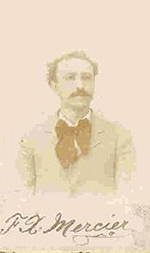Mercier was born in the Faubourg St-Roch in Québec, rue Saint-François.
When he was young, he sang at the church of the Congrégation Jacques-Cartier. The director of the Académie commerciale, managed by the
Frères des écoles chrétiennes, noticed him. He gave him the funds to study at that school.
After school, he first worked as a taylor for a fur company. In 1891, he was hired by the Collège
Mont-Saint-Louis in Montréal.
From 1892 to 1894, he studied speech and solfeggio in Toronto with J.-H. Cameron and Adèle Lemaître. In parallel, he studied with
the conductor and concert impresario F. H. Torrington.
He made his debut in Rigoletto at the Castle Square in Boston, singing the Duca twice. He learned the role within four days
singing the first two acts in English and
the last one in Italian. For the second performance, he sang the third act in English.
After that, he moved back to Toronto and opened a singing school to earn enough money to study in France. He gave
some concerts at the Massey Hall during that time. After earning enough money, he departed to France in September 1898.
He studied voice with the baritone Jacques Bouhy, solfeggio and stagecraft with M. T. Valdéjo.
He is hired by the Opéra-Comique, making his debut in January 1899 in Joseph by Méhul. This seems very unlikely.
The Figaro of January 1899 does not list him at all. Noél & Stoullig as well as Soubies do not list him as ever singing at the
Opéra-Comique in 1899. The book on the Opéra-Comique for 1900-1950 does not list him.
The list of singers having sung at the Opéra-Comique up to 1899 does not list him as well. The revival of Joseph at the
Opéra-Comique
was on June 15, 1899 with Maréchal. It was the first time it was given since Capoul had sung the premiere there. The newspaper Le Gaulois date? wrote:
| Mercier was superb. Powerful voice, perfect diction, expressive acting; he
is a singer and an actor in one. |
Later, he sang José, Vincent and des Grieux. He was also member of the choir of the Church Saint-Philippe-du-Roule.
Starting in 1901, he sang at Covent Garden singing Roméo, Faust, Raoul, José, and Mylio.
Back in France, he sang Arnold in Bordeaux and Rouen, where he got seven curtains after Asile héréditaire.
After that, he toured France, Switzerland, Italy, Belgium (Spa) and Holland: Les huguenots from 28 October 1911 (sharing with J. Duffault who sang the premiere, and with
Charles Fontaine) at 's-Gravenhage, Koninklijke Schouwburg with
Moray/Thomasset/Dyna Beumer/J. Castel, Marthe Darney, Sonia/Souverijn, Janaur, Mouchez, Rigal and Paul Bastide). His repertory included Vasco, Eléazar, Sigurd, Raoul and Faust.
He returned during December 1906 to Canada when his mother was dying. During that time, he sang in Toronto, then in 1907
at the
Auditorium de Québec, at the Manège militaire de Québec and at the Garde indépendante Champlain.
In November 1907, he went back to Paris. He toured Algeria (Constantine, Algiers and Oran). During that tour, he met
Isa Jeynevald (13 January 1886 Lyon – 7 April 1967 Québec, real name Isabelle Besson),
the soprano
singing Marguerite de Valois. They got married on 21 July 1910 in Lyon.
He took part in 22 concerts at Queen's Hall in London, where he sang opera and oratorio with the conductor Henry Wood.
Because of the political situation in Europe, Mercier and his spouse went back to Québec on 15 August 1913. There, they opened
the Institut d'art vocal where Mercier and his spouse taught singing. Among their students were: Horace Philippon,
creator of the Association des chanteurs de Québec, Gilles Lamontagne, Adrienne Roy-Vilandré, Roland Gosselin and Robert L'Herbier.
In 1915, he, well past his best, recorded in New York for Columbia arias and several duets with his spouse.
Later still, both gave concerts at Québec (Club musical de Québec), Saint-Basile (6 July 1919),
Laval University (3 May 1926), at the Salle du Monument National (May 1926), then at the Manège militaire (25 April 1933).
Mercier loved to compose and produced hundreds of melodies. In 1919, he published a series of articles on Classement et la pose de la voix, then in 1923
his memoirs Souvenirs de ma carrière artistique, and in 1928 a book on singing,
Technique de musique vocale.
At the end of autumn 1932, Mercier was poisoned by a gaz leak at this home. He was paralyzed after a fall after returning home and died on 22 December 1932.
His spouse was suspected of causing the leak on purpose to get rid of him but it did not go further.
Reference 1
Reference 2: Opéra de Québec
Reference 3
Reference 4
Reference 5
